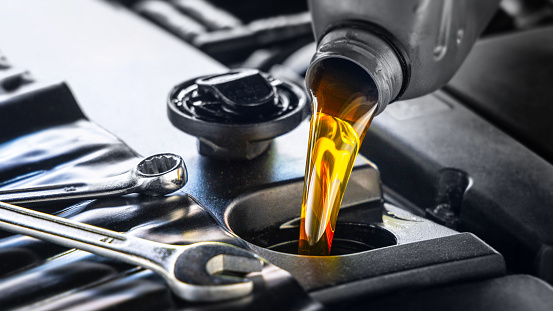January 11, 2025
Which Engine Oil is Best for My Car?
The type of engine oil that is best for your car will depend on several factors, including the make and model of your vehicle, the age of the engine, the type of driving you do, and the climate in which you drive. In general, you should refer to your car owner’s manual to determine the recommended type of oil for your specific vehicle.
Here are some general guidelines to help you understand the different types of engine oil:
- Conventional oil: This is the most common type of engine oil and is made from crude oil. It is generally the least expensive option and is suitable for most cars that are driven under normal conditions.
- Synthetic oil: This type of engine oil is made from a combination of chemicals and can provide better performance and protection than conventional oil. It is generally more expensive but can be a good choice for high-performance or turbocharged engines, or for cars that are driven in extreme temperatures.
- High-mileage oil: This type of oil is designed specifically for engines with over 75,000 miles and can help reduce oil consumption and prevent leaks.
- Diesel oil: This type of engine oil is specifically designed for diesel engines and contains additional additives to help protect the engine from the high pressures and temperatures that are common in diesel engines.
Ultimately, the best type of engine oil for your car will depend on your specific driving needs and the recommendations of your car’s manufacturer. It’s always a good idea to consult your owner’s manual or a qualified mechanic to ensure you are using the correct oil for your vehicle.
How does engine oil viscosity affect my car?
Engine oil viscosity, which refers to the oil’s thickness or resistance to flow, can have a significant impact on the performance and longevity of your car’s engine. Here are some ways in which oil viscosity can affect your car:
- Lubrication: Engine oil is responsible for lubricating the various parts of your car’s engine, reducing friction and preventing wear and tear. If the oil is too thin (low viscosity), it may not provide adequate lubrication, which can cause increased friction and wear on engine components. Conversely, if the oil is too thick (high viscosity), it may not flow through the engine properly, leading to poor lubrication and increased wear.
- Fuel efficiency: Thicker oil (higher viscosity) can also reduce fuel efficiency by making it harder for the engine to turn over and work efficiently. This is especially true in colder temperatures, where thicker oil can take longer to circulate and warm up.
- Temperature regulation: Engine oil also helps regulate engine temperature by absorbing and dissipating heat. Thicker oil can be more effective at this, but only up to a point. If the oil is too thick, it can actually impede heat transfer and cause the engine to overheat.
In general, it’s important to use the oil viscosity recommended by your car’s manufacturer to ensure optimal engine performance and longevity. In some cases, you may need to use a different viscosity oil for extreme temperatures or high-performance engines, but it’s always best to consult with a qualified mechanic before making any changes to your oil type or viscosity.
Some common car engine oils
There are many different types and brands of engine oils available on the market, but here are some of the most common ones:
- Mobil 1: This is a popular synthetic engine oil that is known for its high-performance capabilities and ability to protect engines in extreme temperatures and conditions.
- Castrol Edge: Another popular synthetic engine oil, Castrol Edge is designed to provide superior performance and protection against wear and tear.
- Valvoline: Valvoline offers a range of engine oils, including both synthetic and conventional options, that are designed to meet the needs of different types of engines and driving conditions.
- Pennzoil: Pennzoil is a well-known brand that offers a range of engine oils, including high-mileage and synthetic options, that are designed to protect and enhance engine performance.
- Royal Purple: Royal Purple is a premium synthetic engine oil that is known for its high-performance capabilities, excellent lubrication properties, and ability to protect engines against wear and tear.
It’s important to note that the best engine oil for your car will depend on several factors, including the make and model of your vehicle, the age of the engine, and the driving conditions you typically encounter. Always refer to your car’s owner manual or consult with a qualified mechanic to determine the best engine oil for your specific needs.
What is no 1 engine oil?
When people refer to “No. 1 engine oil,” they may be asking about the top-rated or best-performing engine oil based on industry reviews, performance tests, or brand reputation. However, there is no official or standardized “No. 1 engine oil,” as engine oil performance can vary based on vehicle type, engine specifications, climate conditions, and individual needs.
That said, some of the leading brands in the engine oil market are:
- Mobil 1 – Known for its high-performance synthetic oils and used by many automakers as factory fill.
- Castrol EDGE – Castrol is a prominent brand offering both synthetic and conventional oils, with EDGE being one of its top synthetic oils.
- Royal Purple – Offers high-performance synthetic oils and is often preferred by those seeking top-tier engine protection and performance.
- Valvoline – Known for both synthetic and conventional oils, Valvoline is another trusted brand for engine oils.
- Shell Rotella – Popular for diesel engines, Shell Rotella is also a leader in synthetic oils for passenger cars and trucks.
The “No. 1” oil depends on the specific needs and the engine’s manufacturer requirements. Checking your vehicle’s owner manual will always help guide you to the best oil type and viscosity for optimal performance.


